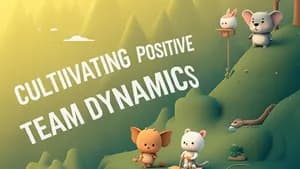Introduction: The Power of Teamwork in Learning
Learning isn't always a solitary pursuit. Many academic challenges, from group projects to collaborative research, demand teamwork. Effective teamwork hinges on strong communication, mutual trust, and collaborative problem-solving. This is where team-building activities come in. They're not just about having fun; they're powerful tools for improving your academic performance and building essential life skills.
Team-building activities, when designed and implemented effectively, can foster a sense of camaraderie and shared purpose. They can help you and your peers overcome communication barriers, learn to leverage each other's strengths, and tackle challenges more efficiently. Whether you're working on a complex science experiment or preparing for a major presentation, the ability to work effectively as a team will significantly enhance your success.
This article will explore several practical team-building activities you can adapt for your study groups or even within your family, improving your learning experience and building strong interpersonal relationships in the process. Remember, the goal is to create an environment of trust and mutual support where everyone feels comfortable contributing their unique skills and perspectives.
Communication Boosters: Talking It Through
Clear and effective communication is the cornerstone of any successful team. Misunderstandings and communication breakdowns are common sources of frustration and conflict, often hindering progress and harming team morale. Activities focused on improving communication can proactively address these issues.
One simple yet effective exercise is the "Blind Drawing" game. One person describes an image or object while others try to draw it based solely on the verbal description. This exercise highlights the importance of precise language, active listening, and clarifying questions. It also provides a lighthearted way to appreciate the nuances of communication and the importance of providing and receiving clear feedback. You can adapt this to your study groups by having one person describe a complex concept or process from your class while others try to illustrate or explain it based on the description alone.
Another valuable activity is the "Two Truths and a Lie" game. Each team member shares three statements about themselves – two true and one false. The others guess which statement is the lie. This exercise encourages active listening and helps your team learn more about each other, building rapport and trust, crucial elements for effective collaboration. For students, this can lead to better understanding of different learning styles and perspectives within the group, leading to more inclusive and effective group projects.
Building Trust: Leaning on Each Other
Trust is a fundamental element of successful teamwork. When team members trust each other, they're more willing to take risks, share ideas openly, and support each other during challenging times. Several activities can foster this sense of trust within a team.
The "Human Knot" is a classic trust-building exercise. Team members stand in a circle, grab two different people's hands across the circle, and then work together to untangle themselves without letting go. This exercise requires cooperation, communication, and a willingness to rely on each other's help. The process of untangling the knot emphasizes the importance of patience and collaborative problem solving. Adapting this for study groups can be done by creating a complex problem where each member represents a part of the solution. Their ability to untangle the problem resembles untangling the human knot.
Another activity that builds trust is the "Trust Fall." One person closes their eyes and falls backward while the other team members catch them. This can be adapted to a less physically demanding version with a verbal “trust fall,” where individuals share vulnerabilities or concerns and rely on the group's support and understanding. This helps everyone feel more comfortable expressing themselves honestly, a vital aspect of both collaborative work and personal growth.
Collaborative Problem Solving: Working Together
Teamwork often means tackling complex problems that require diverse skills and perspectives. Practicing collaborative problem-solving strengthens your ability to effectively work together and overcome challenges.
One effective approach is the "Case Study Analysis." Present your team with a real-world problem or scenario relevant to your studies, and have them work together to analyze it, identify potential solutions, and develop an action plan. This helps your group develop critical thinking skills, learn to build on each other's ideas, and learn to effectively manage disagreements.
Another powerful activity is the "Escape Room" simulation (you can even design your own). These games require teamwork, problem-solving, and creative thinking under time constraints. This experience can greatly aid collaboration techniques and time management skills, both relevant in academic settings. If creating an escape room is not feasible, designing a riddle-based challenge that requires collaborative effort to solve can have a similar effect.
Celebrating Successes: Recognizing Achievements
Teamwork requires consistent effort and commitment. Taking time to celebrate accomplishments, both big and small, reinforces positive behaviors and motivates continued collaboration.
After completing a group project or even a smaller team-building activity, take time to reflect on the process. Discuss what worked well, what challenges you overcame, and what you learned from the experience. Recognizing individual contributions and celebrating collective success builds morale and creates a positive feedback loop, encouraging future collaboration.
You can also introduce simple reward systems, such as team lunches or small tokens of appreciation, to show that their efforts are valued. The simplest way is often the most effective. A heartfelt thank you for the contribution of each member can go a long way towards strengthening the team bond.
Conclusion: Embracing the Collaborative Journey
Team-building activities are not just fun diversions; they're essential tools for developing crucial life skills, enhancing your learning experience, and improving your academic success. By incorporating these activities into your study habits, you will cultivate a supportive and productive learning environment that fosters collaboration, communication, and trust. Remember that effective teamwork requires consistent practice and a commitment to mutual respect and support. Embrace the collaborative journey, and you'll discover the immense power of working together to achieve shared goals.

